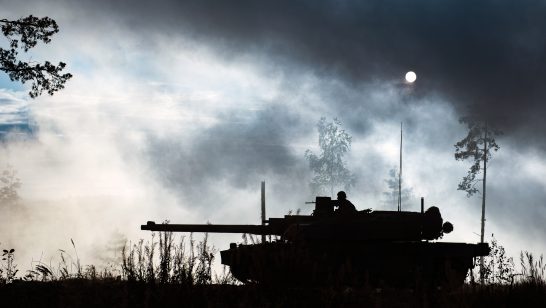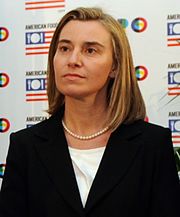
Now that Putin has chosen to incorporate Crimea into the Russian Federation and further Russian incursions into eastern Ukraine cannot be ruled out, the West needs a response to the crisis that goes well beyond sanctions. Our goal must be to avoid a military confrontation with Russia while finding a way to bring Putin to the negotiating table on terms that are acceptable. This means denying him further opportunities to destabilise Europe on the one hand while offering him cooperation on matters of mutual interest on the other.
With regard to the former, three sets of measures are now necessary.
First, if Russian military forces move into parts of eastern Ukraine, the West should offer military equipment, logistics and intelligence support to the government in Kyiv. The US, UK and France offered security assurances to Ukraine in 1994 as part of the deal under which the country agreed to give up its nuclear weapons. These assurances have to mean something. If not, Ukraine will suffer but so too will the nuclear non-proliferation regime.
Second, when President Obama is in Eastern Europe this week he should make it unequivocally clear to Putin that any incursion on to the territory of a NATO member state will be viewed as an attack on NATO as a whole and will be met with a military response. This statement should be backed up with more forward basing of NATO forces in Eastern Europe to re-assure allies in the region. Ambiguity is the friend only of miscalculation in a crisis. A line has to be drawn, and Putin needs to be clear as to where it is.
Third, the level of western economic assistance to Ukraine, Georgia and Moldova should be increased. The citizens of those countries must receive all the support possible in pursuit of their chosen path. If Putin persists in trying to disrupt the process this must be made as expensive and difficult for him as possible.
It is Putin’s own recent behaviour that has rendered this strategy of denial necessary. Denial, however, must not become the ultimate goal of policy. A more cooperative relationship with Russia would serve our interests best and the point of limiting Putin’s options in Europe while escalating his costs is not to defeat him but to persuade him that cooperation is in his interests.
This is not as outlandish as it sounds. A robust Western response in the short-term will provide Putin with a domestic opportunity to say he is standing up to a belligerent West. He will subsequently be able to argue, in terms of his own narrative, that any future dialogue is a mark of Russia’s international standing, particularly if it addresses some long-standing Russian concerns with regard to the entire post-Cold War settlement in Europe. And the need for cooperation is itself real and in his interests as well as ours.
Current crisis management arrangements in the Euro-Atlantic area, for example, are woefully inadequate. In this centenary year of the outbreak of World War One, policy-makers on both sides should remember that catastrophe can happen even when none of the participants intends it. Doing something about this should therefore be the focus of urgent discussion.
For the same reason, fresh impetus should be given to proposals in a recent report by Sam Nunn, Des Browne, Wolfgang Ischinger, and Igor Ivanov. Their ideas on increasing military transparency so as to effectively take the danger of a short-warning military attack off the table in Europe while increasing leadership decision time in a crisis now need urgent adoption. The alternative is to let suspicion, fear and ignorance drive decisions in the midst of a crisis involving nuclear armed participants.
As the EU and Russian economies struggle moreover, an economic win-win in the Greater European area has been stymied by mistrust and antagonism for years. Even as the EU supports countries like Ukraine, Georgia and Moldova economically, therefore, it should make clear to Russia its willingness to start serious dialogue on the idea of a common economic space from Lisbon to Vladivostok. This is a long term Russian goal but is also in the interests of the EU and Ukraine.
Neither the West nor Russia can close down the rest of their relationship while confrontation envelopes Europe. Russia is a veto wielding power in the UN Security Council, a key partner in efforts to secure a resolution to the Iranian nuclear crisis, and a major influencer of events in Syria and the wider Middle East. It is a major supplier of energy to several allies, most notably Turkey, Italy, Germany and the Baltic States, and is vital to both the supply and future withdrawal of thousands of NATO troops currently serving in Afghanistan. For its part the EU represents the largest market for Russian exports, including its energy, and is a key supplier of both technology and investment without which the Russian economy cannot modernise.
In this context, a strategic response to the current crisis means thinking beyond sanctions. It means using a more nuanced mix of instruments to deny Putin opportunities in Europe while pursuing a dialogue with him about cooperation in the interests of all. The challenge for our diplomacy is to ensure the two do not become mutually exclusive.
—
The original version of this piece is being published in Turkish in the April Issue of Analist.
The opinions articulated above represent the views of the author(s), and do not necessarily reflect the position of the European Leadership Network or any of its members. The ELN’s aim is to encourage debates that will help develop Europe’s capacity to address the pressing foreign, defence, and security challenges of our time.



